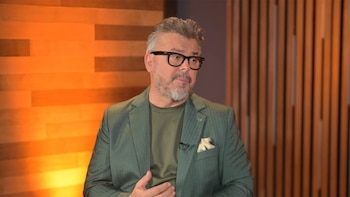
The Olympic hockey teams for all countries will have one thing in common - no National Hockey League (NHL) players on their rosters. However for China their presence at these Olympics were not a foregone conclusion, despite being the host country.
In the lead up to the Beijing Olympics, the Chinese men’s hockey team had concerns they could even field a team. The International Ice Hockey Federation (IIHF) had seen China struggle against other competition and their pairing against medal favorites and hockey superpowers Canada, the United States and Germany were cause for concern.
IIHF President Luc Tardif had said their place was in jeopardy due to their inability to field a competitive team, and that Norway was ready to replace China.

However China was helped by a IIHF rule that allows players to represent a country if they’ve spent at least two years living and playing for the national team. China looked to their domestic squad, the Kunlun Red Star which play in the Kontinental Hockey League (KHL) to recruit talent from abroad in reshaping their roster.
As a result 18 players on the 25-man roster for China are players who were born in, or grew up in North America. And some of them have NHL experience - like American goaltender Jeremy Smith. Smith played 10 games in the NHL for the Colorado Avalanche during the 2016-17 season. He signed a two-year deal in 2019 with Kunlun and was excited for an opportunity to play for China.
“Of course I said yes,” said Smith. “I think it’s an honor to play in the Olympics. But to dream of playing for the host city in the Olympics, I didn’t ever think there would be a chance for me in my lifetime.”
One familiar, and famous name, that stands out on the team is Jake Chelios, son of Chris Chelios who had a storied 26-year NHL career.

“I think half the family was a little confused of what was going on at first, but now they’re starting to understand how special it is,” said Chelios, who moved to Beijing in 2019 to play for Red Star of the KHL.
“Since we’ve been over here for three years, whatever it is, you do start to feel a closeness to China. We’ve been eating Chinese food, we’ve been living the Chinese culture, so there’s a certain closeness you start to feel with China, and you start to feel like you’re actually going to represent them and you want to win for them.”
The NHL’s decision not to send players to Beijing has given China a little more confidence that their team can be more competitive.
“It’s a lot more realistic to do some damage for us,” Chelios said. “We want to challenge the teams and earn some respect for China.”
Últimas Noticias
Sinner-Alcaraz, the duel that came to succeed the three phenomenons
Beyond the final result, Roland Garros left the feeling that the Italian and the Spaniard will shape the great duel that came to help us through the duel for the end of the Federer-Nadal-Djokovic era.
Table tennis: Brazil’s Bruna Costa Alexandre will be Olympic and Paralympic in Paris 2024
She is the third in her sport and the seventh athlete to achieve it in the same edition; in Santiago 2023 she was the first athlete with disabilities to compete at the Pan American level and won a medal.

Rugby 7s: the best player of 2023 would only play the medal match in Paris
Argentinian Rodrigo Isgró received a five-game suspension for an indiscipline in the circuit’s decisive clash that would exclude him until the final or the bronze match; the Federation will seek to make the appeal successful.

Rhonex Kipruto, owner of the world record for the 10000 meters on the road, was suspended for six years
The Kenyan received the maximum sanction for irregularities in his biological passport and the Court considered that he was part of a system of “deliberate and sophisticated doping” to improve his performance. He will lose his record and the bronze medal at the Doha World Cup.

Katie Ledecky spoke about doping Chinese swimmers: “It’s difficult to go to Paris knowing that we’re going to compete with some of these athletes”
The American, a seven-time Olympic champion, referred to the case of the 23 positive controls before the Tokyo Games that were announced a few weeks ago and shook the swimming world. “I think our faith in some of the systems is at an all-time low,” he said.





